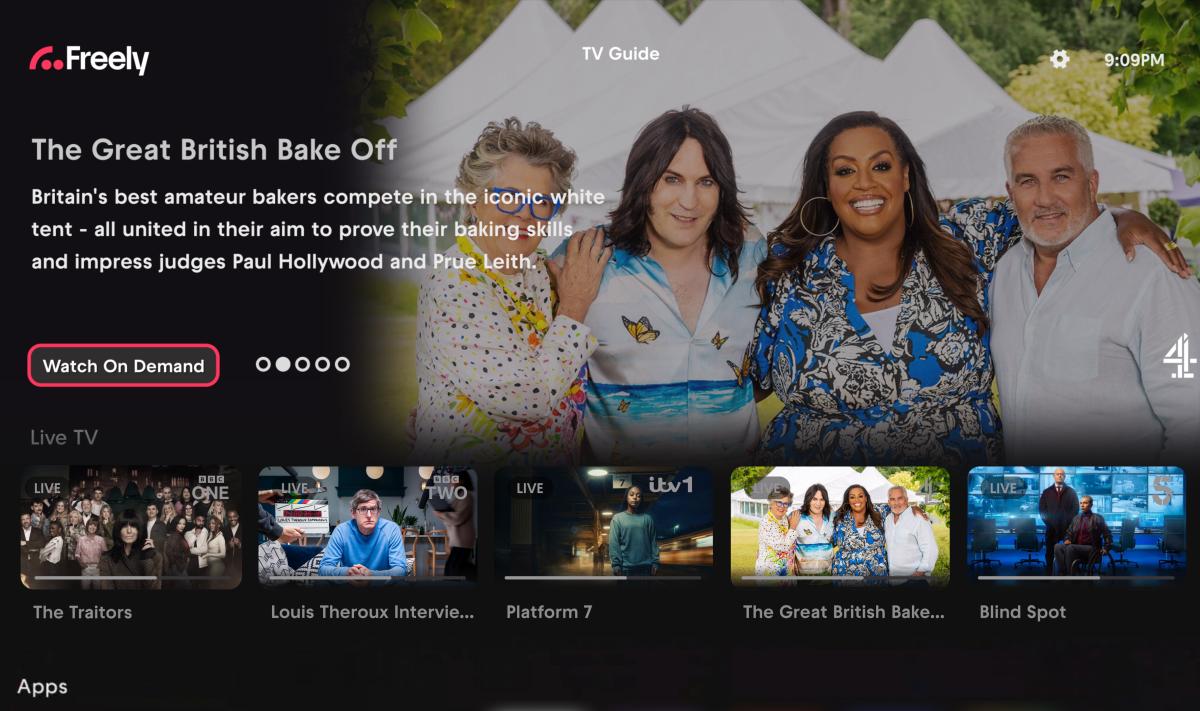The BBC, ITV, Channel 4, and Channel 5 have announced this morning that they are developing a joint CTV offering called ‘Freely’, which is set for launch in 2024. The joint service, specifically designed for smart TVs, will carry free IP-delivered streams of the participating broadcasters’ channels, as well as on-demand content.
The project is being handled by Everyone TV, previously known as Digital UK, the organisation joint-owned by all of the above broadcasters which handles free TV platforms Freeview and Freesat. The aim is for Freely to come pre-built into new smart TVs, meaning users won’t have to download the app in order to access it.
Everyone TV actually already runs a streaming service fairly similar to Freely, called Freeview Play. Like Freely, Freeview Play hosts live channels and on-demand content from all of the UK’s major broadcasters.
But the live channels – while browsable within the Freeview Play interface – are only available to users with an aerial plugged into their TV set, since the content is still delivered via broadcast. With Freely, live channels will be delivered via IP.
Fighting for prominence in an IP-first future
The broadcasters involved say they’ve created Freely in preparation for an IP-first future.
Several broadcasters, the BBC included, have predicted that in the not-too distant future, all TV content will be IP-delivered. And indeed 15 percent of UK TV homes are already IP-only, according to Barb’s Establishment Survey.
In a world where a set-top box isn’t required for linear channels, it’s unclear who will own the core browsing interface which sits behind the live TV viewing experience. Several players already seem to be shaping up to play that role, namely the free ad-supported streaming TV providers, which provide a browsing experience akin to traditional TV.
With Freely, the UK’s broadcasters are staking their claim to this role. The press release announcing the project stated that Freely will host the PSBs channels, but also other free-to-air channels, indicating that it will hold live channels from other broadcasters too.
By owning the interface themselves, the broadcasters will be able to ensure their own prominence within it, appearing as the first channels a user scrolls through (as is the case on traditional linear TV). And the app itself will also be assured prominence on smart TVs and connected devices, since this will be mandated by upcoming UK laws.
Known unknowns
While the news is hugely significant, there are still plenty of questions around what exactly the service will end up looking like, and how it will work from an advertising perspective.
While Freeview Play presents all the PSBs content in one place, the user experience is still quite fragmented. When users click to play a piece of content they’re led back to the relevant broadcaster’s own streaming app, and the content is played from there. This design made it easier for broadcasters to commit to the service without worrying too much about cannibalising their own streaming services.
But that presumably won’t be the case for the live portion of Freely. The broadcasters say that Freely aims to replicate the traditional live TV viewing experience. It’s hard to see how this would be compatible with a model where live TV is delivered via each broadcaster’s own app, meaning it will likely have to be run from Freely itself.
This then raises questions around who will control the ad experience within Freely, and whether broadcasters will be able to run targeted ads during these live streams, as is sometimes the case on live viewing on their own apps.
The other major unknown is what other types of content providers might be allowed to run channels on Freely in the future. The growth of FAST has made it much easier to spin up and wind down linear channels, bringing a whole range of new content providers into the space. Whether these players, who aren’t a part of the traditional TV world, might eventually be invited onto Freely remains to be seen.




